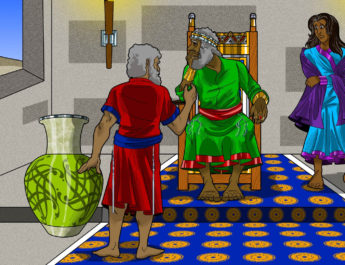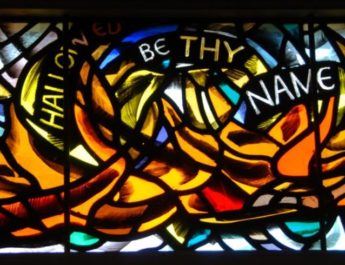Matthew 27:11-14, 27-37
Majesty of Christ – A Women’s Lectionary
11 Now JesusA stoodB before the governor,C
A “Jesus” = Iesous. From Hebrew Yehoshua (Joshua, the Lord is salvation); {from YHVH (proper name of the God of Israel; the self-existent and eternal one); {from havah (to become) or from hayah (to come to pass, become, be)} + yasha (to deliver, defend, help, preserve, rescue; properly, to be open, wide or free, which implies being safe. So, in a causative sense, this is to free someone)}. This is Jesus or Joshua in Greek – the Lord saves or the Lord is salvation.
B “stood” = histemi. This is to stand, place, establish, appoint, stand ready, be steadfast.
C “governor” = hegemon. From hegeaomai (to think, suppose, have an opinion; to lead the way, what comes in front or first, initial thought, high esteem or authority; one who commands in an official capacity); from ago (lead, bring, carry, drive, go). This is a leader in general, but also specifically a governor or commander. This is where “hegemony” comes from.
and the governor askedD him, “AreE you the kingF of the Jews?”G
D “asked” = eperotao. From epi (on, upon, against, what is fitting) + erotao (asking a question or making an earnest request; used when one anticipates special consideration for their request); {from eromai (to ask) OR from ereo (to say, tell, call, speak of)}. This is to question, interrogate, seek, or demand. The questioner is at an advantage – in a preferred position when they make their question.
E “are” = eimi. This is to be, exist.
F “king” = basileus. Probably from basis (step, hence foot; a pace); from baino (to walk, to go). This is king, emperor, or sovereign.
G “Jews” = Ioudaios. From Ioudas (Judah, Judas); from Hebrew Yehudah (Judah, son of Jacob, his tribal descendants, a name for the southern kingdom. Literally, it means praised); probably from yadah (to throw one’s hands into the air in a gesture of praise); from yad (hand). This is Jewish, a Jew, or Judea.
Jesus said,H “You say so.” 12 But when he was accusedI by the chief priestsJ and elders,K he did not answer.
H “said” = phemi. From phao (to shine). This is to declare, say, or use contrasts in speaking to shed light on one point of view.
I “accused” = kategoreo. From kategoros (prosecutor or accuser; used in legal context, but also of Satan); {from kata (down, against, throughout, among) + agoreuo (speaking in the assembly)} OR {from kata (see above) + agora (assembly, forum, marketplace, town square); {from ageiro (to gather)}}. This is to accuse, charge, or prosecute. This is where the word “category” comes from, but it is in the sense of applying logic and offering proof.
J “chief priests” = archiereus. From archo (to rule, begin, have first rank or have political power) + hiereus (a priest literal or figurative – of any faith); {from hieros (sacred, something sacred, temple, holy, set apart; something consecrated to God or a god)} This is a high or chief priest.
K “elders” = presbuteros. From presbus (old man). This is an elder as one of the Sanhedrin and also in the Christian assembly in the early church.
13 Then PilateL said to him, “Do you not hearM how many accusations they make againstN you?”
L “Pilate” = Pilatos. From Latin Pilatus (may mean one who has skill with a javelin); perhaps from pilum (javelin) OR perhaps from pileus (a soft cap made of felt that was brimless and was associated with people who were freedmen). This is Pilate. See https://en.wikipedia.org/wiki/Pontius_Pilate
M “hear” = akouo. This is hear or listen, but it also means to understand by hearing. This is where the word “acoustics” comes from.
N “make against” = katamartureo. 3x in NT. From kata (down, against, throughout, among) + martureo (to testify, give evidence; testify in a literal or figurative sense); {from martus (a witness whether having heard or seen something; witness literally, judicially, or figuratively; by analogy, a martyr)}. This is testify or bear witness against.
14 But he gave him no answer, not even to a singleO charge,P so that the governor was greatlyQ amazed.R
O “single” = heis. This is one, a person, only, some.
P “charge” = rhema. Related to “asked” in v11. From rheo (to speak, command, make, say, speak of); from ereo (see note D above). This is word, which implies a matter or thing spoken, a command, report, promise, thing, or business. Often used for narration, commands, or disputes.
Q “greatly” = lian. 12x in NT. This is very, exceedingly, utterly, vigorously.
R “amazed” = thaumazo. From thauma (a wonder or marvel; used abstractly for wonderment or amazement; something that evokes emotional astonishment); may be from theaomai (to behold, look upon, see, contemplate, visit); from thaomai (to gaze at a spectacle; to look at or contemplate as a spectator; to interpret something in efforts to grasp its significance). This is to marvel, wonder, or admire. To be amazed out of one’s senses or be awestruck. Being astonished and starting to contemplate what was beheld. This root is where the word “theatre” comes from.
27 Then the soldiersS of the governor tookT Jesus into the governor’s headquarters,U
S “soldiers” = stratiotes. From stratia (army; used figuratively for large organized groups like the angels and the hosts of heaven, which is to say the stars); from the same as strateuo (to wage war, fight, serve as a soldier; used figuratively for spiritual warfare); or from the base of stronnuo (to spread, to spread out like a bed). This is a soldier in a literal or figurative sense.
T “took” = paralambano. From para (beside, by, in the presence of) + lambano (active acceptance/taking of what is available or what has been offered; emphasizes the choice and action of the individual). This is to receive, take, acknowledge, associate with. It can also mean to take on an office or to learn.
U “governor’s headquarters” = praitorion. 8x in NT. From Latin praetorium (headquarters, general’s tent, villa, place where the governor lives); from prator (leader, chief, president); from pareeo (to lead, go before). This is praetorium or preatorian guard. It is the place where the governor lives or the place where the praetorian guard of Rome lived. It could also mean courtroom. See https://en.wiktionary.org/wiki/praetorium#Latin
and they gatheredV the wholeW cohortX around him.
V “gathered” = sunago. Related to “governor” in v11. From sun (with, together with, closely associated) + ago (see note C above). This is to lead together and so to assemble, bring together, welcome with hospitality, or entertain. In the sense of assembly, this is the root of the word “synagogue.”
W “whole” = holos. This is whole, complete, or entire. It is a state where every member is present and functioning in concert. This is the root of the word “whole.”
X “cohort” = speira. 7x in NT. From Latin spira (something wound up like a coil or twist, the base of a column, a hair braid, etc.); from Greek speira (a twist or wreath); from Proto-Indo-European *sper- (to twist, turn). This is a group of soldiers or military guard. Properly, this is something wound up. Figuratively, it refers to a group of men. Thus, a tenth of a legion. Also used for Levitical janitors. This is where the word “spiral” comes from. See https://en.wiktionary.org/wiki/spira#Latin.
28 They strippedY him and put a scarletZ robeAA onBB him,
Y “stripped” = ekduo. 6x in NT– 3x Jesus being stripped before crucifixion, 2x in 2 Corinthians 5:3-4 as a metaphor for death – being stripped of this earthly tent, & 1x in Parable of the Good Samaritan when the man is attacked. From ek (from, from out of) + duo (to sink). This is to strip off or take off.
Z “scarlet” = kokkinos. 6x in NT. From kokkos (kernel, seed). This is scarlet or cloth that is dyed scarlet from a dye made from an insect.
AA “robe” = chlamus. 2x in NT– both in Matthew 27. This is a chalmys – a sort robe or cloak that soldiers wore as well as magistrates and kings. It is a garment that denotes dignity or a particular office that is worn on top of the tunic.
BB “put…on” = peritithemi. 8x in NT. From peri (about, concerning, all around, encompassing) + tithemi (to put, place, set, fix, establish in a literal or figurative sense; properly, this is placing something in a passive or horizontal position). This is to place around i.e. to clothe. Figuratively, it can mean to bestow or to present.
29 and after twistingCC some thornsDD into a crownEE they putFF it on his head.GG
CC “twisting” = pleko. 3x in NT– all in Gospel parallels of soldiers mocking Jesus. This is to twist, braid, or weave together.
DD “thorns” = akantha. 14x in NT. From akmen (even now, still yet); from the same as akmazo (ripe, to be vigorous); from akme (point, edge); related to ake (a point). This is thorn or thorn bush.
EE “crown” = stephanos. 18x in NT. From stepho (to twine, encircle). This is something that surrounds i.e. a crown or garland. Properly, this refers to the wreath or garland that the winner of athletic games would win. It symbolized victory and honor from skill as contrasted with a royal crown, which is diadema in Greek. This is the word used for the crown that the saints in heaven wear in, for example, Revelation 4:4.
FF “put” = epitithemi. Related to “put…on” in v28. From epi (on, upon, what is fitting) + tithemi (see note BB above). This is to lay on or place on, whether in a friendly or aggressive way.
GG “head” = kephale. This is head or chief. It can be a literal head or, figuratively, a ruler or lord. It can also refer to a cornerstone. This is where the word “cephalic” comes from.
They put a reedHH in his right handII and kneltJJ before him and mockedKK him,
HH “reed” = kalamos. 12x in NT. This is a reed, whether the plant itself or a stem that is like the reed. It can also imply a staff, pen, or measuring rod.
II “right hand” = dexios. Perhaps from dechomai (to warmly receive, be ready for what is offered, take, accept, or welcome; to receive in a literal or figurative sense). This is right, right side, or the right hand.
JJ “knelt” = gonupeteo. 4x in NT. From gonu (knee) + pipto (to fall in a literal or figurative sense). This is to kneel or bow for supplication or entreaty.
KK “mocked” = empaizo. 13x in NT. From en (in, on, at, by, with, among) + paizo (to play like a child does – can include singing and dancing); {from pais (child, youth, servant, slave); perhaps from paio (to strike or sting)}. This is to mock, ridicule, jeer.
saying, “Hail,LL King of the Jews!” 30 They spat on him and tookMM the reed and struckNN him on the head.
LL “hail” = chairo. From char– (to extend favor, lean towards, be inclined to be favorable towards). This is to rejoice, be glad or cheerful; a greeting. This is the root verb that the Greek word for “grace” comes from (charis).
MM “took” = lambano. Related to “took” in v27. See note T above.
NN “struck” = tupto. 14x in NT. This is to strike, beat, or wound – generally with a stick or cudgel. It is hitting with repeated blows. So, it contrasts with paiso and patasso, which describe single blows by hand or weapon. Also contrast plesso (beating with a fist or hammer), rhapizo (to slap), and tugchaono (hitting accidentally). This word is hitting to punish. Figuratively, it can refer to being offended.
31 After mocking him, they stripped him of the robe and put his own clothesOO onPP him. Then they led him awayQQ to crucifyRR him.
OO “clothes” = himation. From heima (garment) OR from ennumi (to put on). This is the outer garment, cloak, robe, or mantle. It is worn loosely over a tunic.
PP “put…on” = enduo. Related to “stripped” in v28. From en (in, on, at, by, with, among) + duno (to sink into, set like the sun); {from duo (see note Y above)}. This is to put on as when one puts on clothes. It is the idea of sinking into one’s clothing.
QQ “led…away” = apago. Related to “governor” in v11 & “gathered” in v27. 16x in NT. From apo (from, away from) + ago (see note C above). This is to lead away, take away, or bring. Figuratively, it can refer to being led astray or put to death.
RR “crucify” = stauroo. Related to “stood” in v11. From stauros (upright stake, cross; literally the horizontal beam of a Roman cross, generally carried by the one convicted to die); from the same as histemi (see note B above). This can be to attach someone to a cross or fencing with stakes. In a figurative sense, it could be to destroy, mortify, or subdue passions/selfishness.
32 As they went out,SS they came uponTT a manUU
SS “went out” = exerchomai. From ek (from, from out of) + erchomai (to come, go). This is to go out, depart, escape, proceed from, spread news abroad.
TT “came upon” = heurisko. This is to find, learn, or obtain. It is to discover something, which generally implies a period of searching for it. This is to find in a literal or figurative sense. This is where the word “heuristic” comes from.
UU “man” = anthropos. Probably from aner (man, male, husband) + ops (eye, face); {from optanomai (to appear, be seen); perhaps from horao (become, seem, appear)}. This is human, humankind. Used for all genders.
from CyreneVV namedWW Simon;XX
VV “Cyrene” = Kurenaios. 6x in NT. From Kurene (Cyrene, a Greek mythological figure; perhaps meaning sovereign queen). This is from Cyrene. See https://en.wikipedia.org/wiki/Cyrene_(mythology)
WW “named” = onoma. May be from ginosko (know, recognize, learn from firsthand experience). This is a name, authority, cause, character, fame, reputation. The name was thought to include something of the essence of the person so it was not thought to be separate from the person.
XX “Simon” = Simon. From Hebrew Shimon (Simon – Jacob’s son and his tribe); from shama (to hear, often implying attention and obedience). This is Simon, meaning “he who hears.”
they compelledYY this man to carryZZ his cross.AAA
YY “compelled” = aggareuo. 3x in NT – 2x of Simon the Cyrene & 1x “if anyone forces you to go one mile, go also the second mile” from Matthew 5:41. From Persian, but compare Aramaic iggerah (a letter); corresponding to Hebrew iggereth (letter); from the same as Agur (hired, gathered, received from the sages); from agar (to gather or harvest). This means to impress into service, to force. It can also mean send someone on an errand, particularly as a courier or other public service.
ZZ “carry” = airo. This is to lift up in a literal or figurative sense. So, it could mean to lift, carry, or raise. It could also imply lifting something in order to take it away or remove it. Figuratively, this can be used for raising the voice or level of suspense. It can mean sailing off as raising the anchor. It can also correspond to a Hebrew expression for atonement of sin (lift/remove sin).
AAA “cross” = stauros. Related to “stood” in v11 & “crucify” in v31. See note RR above.
33 And when they cameBBB to a placeCCC called GolgothaDDD (which meansEEE Place of a Skull),FFF
BBB “came” = erchomai. Related to “went out” in v32. See note SS above.
CCC “place” = topos. This is a place or region. It is a smaller space that can only hold a limited number of people whereas chora is a larger place. Figuratively it could be an opportunity.
DDD “Golgotha” = Golgotha. 3x in NT. From Aramaic golgolta (skull); from Hebrew gulgolet (skull, head; a census or poll that counts people by head); from galal (to roll in a literal or figurative sense, roll away, roll down, wallow, remove, trust). This is Golgotha, skull. See https://en.wikipedia.org/wiki/Calvary & https://en.wiktionary.org/wiki/%D7%92%D7%95%D7%9C%D7%92%D7%95%D7%9C%D7%AA
EEE “means” = eimi. Same as “are” in v11. See note E above.
FFF “Skull” = kranion. 4x in NT. From kara (the head) OR from the base of keras (horn or something horn-shaped; horn in a literal or figurative sense – that which prevails or a symbol of power). This is skull. It’s where we get the word “cranium” from.
34 they offeredGGG him wineHHH to drink,III mixed with gall,JJJ but when he tastedKKK it, he wouldLLL not drink it.
GGG “offered” = didomi. To give, offer, place, bestow, deliver. This is give in a literal or figurative sense.
HHH “wine” = oinos. Perhaps from Hebrew yayin (wine; root means to effervesce). This is wine. It is where the word “oenophile” comes from.
III “drink” = pino. This is to drink, literally or figuratively.
JJJ “gall” = chole. 2x in NT. This is gall or bitter herbs. May be used figuratively to mean poison or bitterness.
KKK “tasted” = geuomai. 15x in NT. This is to taste, which implies eating. It can be used figuratively to mean experience, whether positively or negatively.
LLL “would” = thelo. This is to wish, desire, will, or intend. It is to choose or prefer in a literal or figurative sense. It can also mean inclined toward or take delight in. It can have a sense of being ready to act on the impulse in question.
35 And when they had crucified him, they dividedMMM his clothes among themselves by castingNNN lots;OOO, PPP
MMM “divided” = diamerizo. 12x in NT. From dia (through, across to the other side, thoroughly) + merizo (to divide, part, share, distribute, assign; figuratively, to differ); {from meros (part, share, portion figurative or literal); from meiromai (to get your share, receive one’s allotment)}. This is to divide up, distribute, or share. Figuratively, it can mean dissension.
NNN “casting” = ballo. This is to throw, cast, rush, place, or drop. It is throwing, but it could be with more or less velocity and with more or less force/violence.
OOO “lots” = kleros. 12x in NT. Perhaps from klero (casting a lot) or from klao (to break in pieces as one breaks bread). This lot, portion, heritage. It is that share assigned to you. It could also refer to a lot used to determine something by fate, chance, or divine will.
PPP Some manuscripts add, “in order that what had been spoken through the prophet might be fulfilled, ‘They divided my clothes among themselves, and for my clothing they cast lots’” = hina + pleroo + ho + ereo + hupo + ho + prophetes + diamerizo + ho + himation + ego + heautou + kai + epi + ho + himastismos + ego + ballo + kleros. “Fulfilled” = pleroo. From pleres (to be full, complete, abounding in, occupied with). This is to fill, make full or complete. Properly, this is filling something up to the maximum extent that it can be filled – an appropriate amount for its individual capacity. So, this is used figuratively for furnish, influence, satisfy, finish, preach, perfect, and fulfill. “Prophet” = prophetes. Related to “said” in v11. From pro (before, in front of, earlier than) + phemi (see note H above) or phaino (to bring light, cause to appear, shine, become visible or clear)}. This is a prophet or poet – one who speaks with inspiration from God. “Clothing” = himatismos. Related to “clothes” in v31. 6x in NT. From himatizo (to clothe, dress, give clothing); from himation (see note OO above) OR from ennumi (to put on). This is clothing, apparel.
36 then they sat downQQQ there and kept watchRRR over him. 37 Over his head they put the chargeSSS against him, which read,TTT “This is Jesus, the King of the Jews.”
QQQ “sat down” = kathemai. From kata (down, against, throughout, among) + hemai (to sit). This is to sit, be enthroned, or reside.
RRR “kept watch” = tereo. Related to “amazed” in v14. From teros (a guard or a watch that guards keep); perhaps related to theoreo (gazing, beholding, experiencing, discerning; looking at something to analyze it and concentrate on what it means; the root of the word “theatre” in that people concentrate on the action of the play to understand its meaning); from theaomai (see note R above). This is to guard, observe, keep, maintain, or preserve. It can also be used figuratively for spiritual watchfulness. It is guarding something from being lost or harmed – keeping an eye on it. Contrast the Greek phulasso, which is to guard something so that it doesn’t escape. Also contrast koustodia, which generally denotes a fortress or military presence. This word can mean fulfilling commands, keeping in custody, or maintaining. It can also figuratively mean to remain unmarried.
SSS “charge” = aitia. From aiteo (to ask, demand, beg, desire). This is a cause or reason. It can also be a legal crime, accusation, guilt, or case.
TTT “read” = grapho. This is to write or describe. It is where the word “graphic” comes from.
Image credit: “Christ Downcast” by Jesús Armando Martínez Rosas, 2017.




